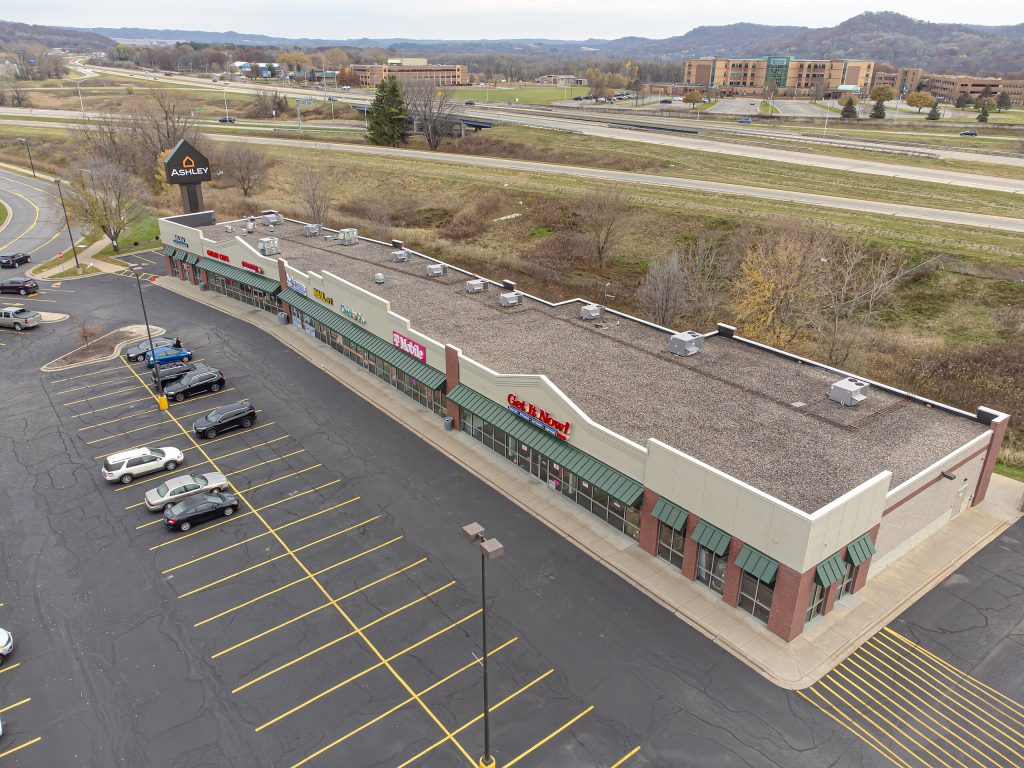How Strip Malls Failed the Burbs
All the city news you can use.

Strip mall in Onalaska, Wisconsin. (CC0 1.0 Universal)
Every day at The Overhead Wire we sort through over 1,500 news items about cities and share the best ones with our email list. At the end of the week, we take some of the most popular stories and share them with Urban Milwaukee readers. They are national (or international) links, sometimes entertaining and sometimes absurd, but hopefully useful.
How strip malls failed the suburbs: Strip malls and their swaths of parking were built to serve suburban drivers as an alternative to department stores in the urban core. As they evolved into big boxes they made a major urban design mistake, having the parking lots instead of the buildings front the street. Now, many of those original places of commerce are half empty and falling into disrepair which could mean a rebirth in more housing and better urban design. (James Lileks | Minneapolis Star Tribune)
Build like Switzerland: To avoid sprawl, about 25 years ago the Swiss canton (read state/county) of Zurich allowed municipalities to upzone to allow the construction of more housing. Research found that rent growth in areas that upzoned the most and built housing was kept under control. Of course more changes in municipal code and provision of improved services are necessary to facilitate change, but the example shows that going big on upzoning can benefit residents long term. (Eliza Relman | Business Insider)
Change the zoning frame: The language and framing used to discuss zoning reform in the United States is often confusing and negative which could lead to alienation of potential supporters and voters argues Jenny Schuetz. She believes “End Single Family Zoning” should be replaced by language discussing the legalization of housing types that aren’t currently allowed. (Jenny Schuetz | Brookings)
Winning over skeptics with safety data: Alphabet’s autonomous vehicle startup Waymo knows that people are skeptical of vehicles without drivers. To change that perception, they hope reams of safety data will persuade people otherwise. That’s why they’ve released a website that shares safety data on miles driven with passengers and have shared information with third party researchers. The data shows greater safety, but it’s unknown how much it will move people’s opinions. (Andrew J. Hawkins | The Verge)
South Carolina moving on managed retreat: The State of South Carolina’s climate resilience office has acknowledged that hundreds of thousands of homeowners will need to retreat away from the coast. A resilience plan identified 700k homes targeted for demolition and supports managed retreat programs that will streamline buyouts in the future, but voluntary uptake has been slow and flippers can offer much less money and faster. Officials say that unfortunately the best time to get people to think about moving away is after a bad flood. (Daniel Shailer | Route Fifty)
Quote of the Week
Some experiences are just not meant for the car or carryout, which would seem self-obvious. But you’ll find four-wheeled connoisseurs digging into tomahawk steaks, Maryland blue crabs, a Cajun seafood platter, a Philippine lechon tray for two and other dishes that seem like children lost when consumed in a car. Without a heavy carving board and a steak knife, without the brown paper rolled out on a picnic table and a bucket of cold ones within reach, without the fiddle-and-accordion music waltzing in the background, without loved ones around to share with, these meals are compromised experiences.
–Tim Carman in the Washington Post discussing social media food reviewers doing so not in the restaurant, but in their cars.
This week on the Talking Headways podcast, we’re joined by Dylan Rivera and Jacob Sherman of the Portland Bureau of Transportation to discuss micromobility regulation.
Want more links to read? Visit The Overhead Wire and signup.
If you think stories like this are important, become a member of Urban Milwaukee and help support real, independent journalism. Plus you get some cool added benefits.
Urban Reads
-
Congestion Pricing Cuts Air Pollution in New York City
 Dec 14th, 2025 by Jeff Wood
Dec 14th, 2025 by Jeff Wood
-
We Think We Love to Drive. But Do We Really?
 Dec 7th, 2025 by Jeff Wood
Dec 7th, 2025 by Jeff Wood
-
Can Scott Wiener Tackle America’s Housing Crisis?
 Nov 23rd, 2025 by Jeff Wood
Nov 23rd, 2025 by Jeff Wood





















